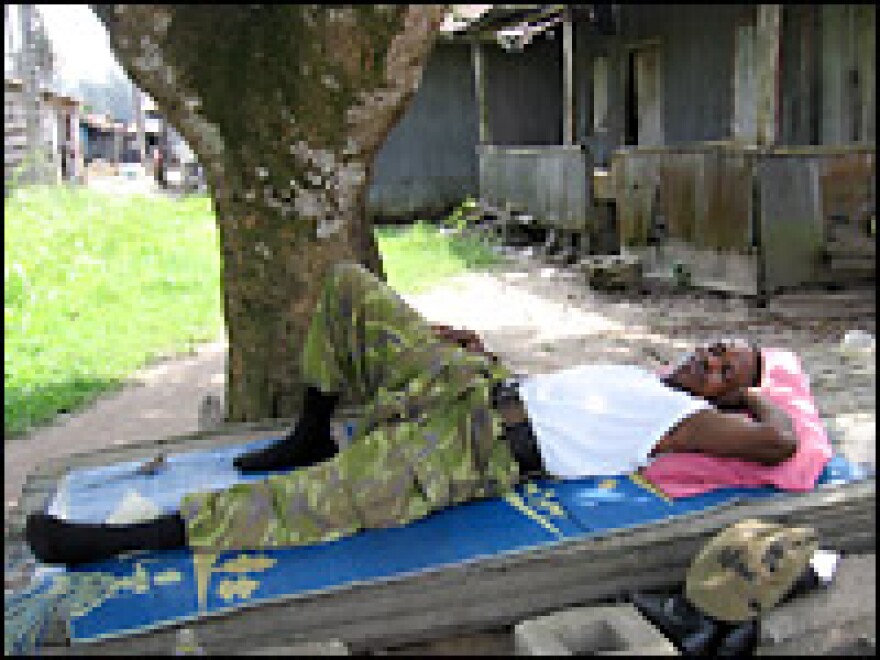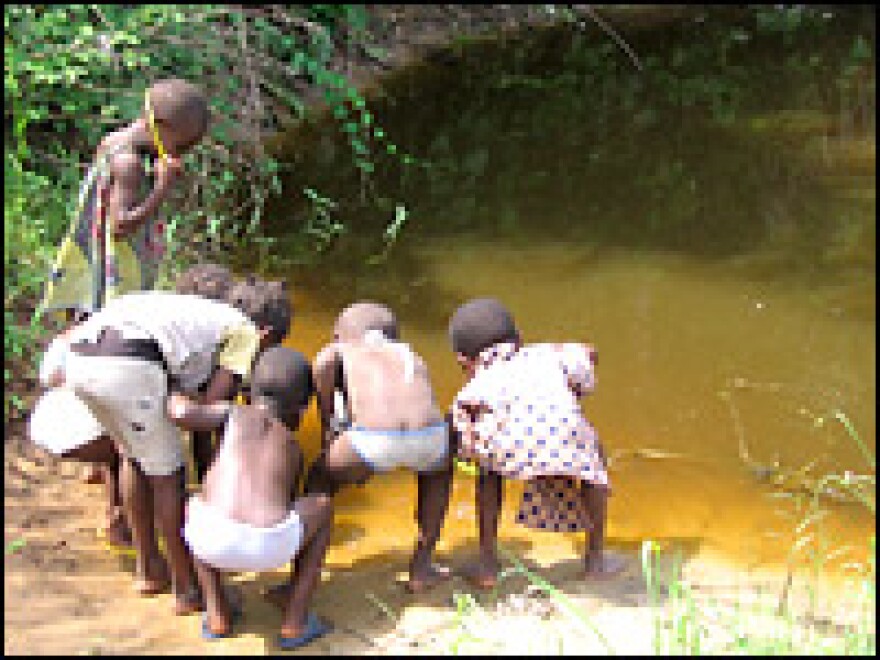


Three foreign oil workers -- including two Americans -- are still being held hostage in Nigeria as part of a disruptive campaign against the government by militants in the volatile oil-producing Niger Delta.
The militants are sabotaging Nigerian crude oil exports in their efforts to gain more benefits for people living in the oil-rich delta. They have threatened to step up attacks.
Militants released oil worker Macon Hawkins of Texas into the hands of a group of foreign journalists last week. It was Hawkins 69th birthday. Suffering from diabetes and high blood pressure, the Shell Nigeria construction manager had been a hostage in the Niger Delta for two weeks. He had a message for Washington.
"I think the U.S. needs to keep up the pressure on the Nigerian government to pay attention to these people, and do something about their poor conditions," Hawkins said. "Because I honestly, truly believe these people will fight till death. And there's going to be one behind every tree from now on."
The Movement for the Emancipation of the Niger Delta is behind the kidnappings. The group has warned that it will drive oil companies like Shell, Chevron and Exxon-Mobil out of the delta.
Since Nigeria started pumping oil in the 1950s, the people of the Niger Delta have been pushing for more resources and more money. Princeton Lyman, a former United States ambassador to Nigeria, and currently director of africa policy studies at the Council on Foreign Relations, describes this as an evolution of anger.
"What's happened recently is that unrest has morphed into a series of militias, and sometimes criminal gangs, who have benefited by stealing the oil and creating an outright challenge to the government," Lyman said.
Obioku is a remote village nestling in the maze of lush mangrove creeks that form the heart of the Niger Delta. With its fragile huts made of thatched palm fronds and mud, Obioku is typical of many fishing villages in the Delta. It is small and dirt poor, despite the region's oil wealth.
Children play homemade drums along the sandy paths of the village. Soldiers are guarding Obioku after deadly clashes over land rights with neighbouring Odioma town last year. Both communities have laid claim to an area that Shell is planning to explore for oil.
More than a dozen Obioku people were killed, including the18-year-old daughter of Chief Ayebanoa Stephen Debo, a fisherman. He said conflicts over oil were fuelled by poverty and greed in a nominally rich region. But, said Chief Debo, there's no trickle down.
"That's why we're looking to Shell to help us, so that we can be able to survive," the chief said. "I'm trying to weave my net for fishing. If you have the tools, if you're having the nets, engine and the boat to move along, you can feed yourself."
There are few jobs in Obioku and no grid electricity or running water. The village women, like Cordelia Bendick, say their children get sick because of the muddy, brown water they use in everyday life.
All oil revenues in Nigeria go to the central government, which hands back 13 percent to the oil-producing states. Niger Delta villagers, like the people of Obioku, criticise the Nigerian government and Shell. The say that's not enough.
Don Boham, the manager of corporate external affairs at Shell's Nigeria headquarters Port Harcourt, says that the government is responsible for these villages, not Shell.
"Expectations have increased ... on the role that the oil companies have to play in providing basic amenities, whereas it is rightly the responsibility of government," Boham said.
Whoever is responsible, foreign oil workers are now bearing the brunt of local anger. Kidnapping has become an occupational hazard. The government claims it's doing what it can to protect all those living and working in the Delta. The authorities have dismissed the militants as nothing more than criminals.
"It's very unfortunate where people with criminal intentions and criminal mentality have [basically] taken the law into their own hands and have started kidnapping people for reasons that are far from political," said Femi Fani-Kayode, a presidential spokesman.
Local people and militants may be focused on their own interests, but disquiet and unrest in Nigeria's Niger Delta impact the world. Stop-go oil output has a knock-on effect on energy and gas prices in the United States, which gets one fifth of its crude oil imports from Nigeria.
President Bush has said he wants to see more supplies from this region. Neglecting the delta communities could spell disaster warns Nalaguo Chris Alagoa, a Niger Delta activist working on conflict prevention and resolution.
"The Niger Delta is like a keg of gunpowder at the bottom of Nigeria. If nothing is done, it has the capacity of exploding," Alagoa said. "And when it explodes like dynamite, it will blow everything that is above it to smithereens."
Villagers in many poorly-developed parts of the Niger Delta, like Obioku, say they don't agree with the abduction of foreign oil workers because it's against the law. But many also say they understand the motives behind the militants' sabotage campaign: to make news and try to improve their lives.
"We are still begging the Shell people to help us, help us to do something to help ourselves with our family and husbands," villager Cordelia Bendick said.
Copyright 2022 NPR. To see more, visit https://www.npr.org.



